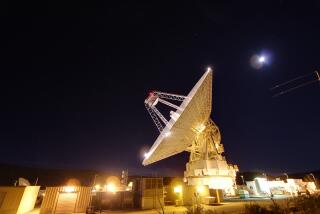Call to Heavens Goes Unanswered in Russia
- Share via
BAIKONUR, Kazakhstan — Ivan Pozdayev and his classmates at the International Space School in this Russian military enclave ignite a model rocket made from Coca-Cola bottles and grin as it soars high over the treetops.
But Ivan, 12, frowns when asked if he wants to be a cosmonaut. A rocket scientist, then? He shrugs. “Maybe.”
Even here in Baikonur -- a city created out of Kazakhstan’s barren steppe in the 1950s to be the secret heart of the Soviet space program -- persuading young Russians to pursue a career in the underfunded and struggling program is not easy.
For Russia, it is a pressing one: Its space program is largely peopled by experts hired at the beginning of the space age. Many are now in their late 50s or early 60s and thinking about retirement, and the country needs to ensure that a new generation is in place to take over.
“Unfortunately, there is very little interest among young people,” said Igor Barmin, chief engineer of the Baikonur launch pad, where the Soviet space program awed the world by sending the first satellite, Sputnik, into orbit in 1957 and cosmonaut Yuri Gagarin four years later.
In the United States, the National Aeronautics and Space Administration also anticipates a large number of retirements in the next 10 years, but space experts said NASA has been more successful at recruitment than the Russians. NASA’s top managers are in their late 40s or 50s.
“The Russians are in trouble,” said James Oberg, author of the book “Star-Crossed Orbits: Inside the U.S. and Russian Space Alliance.” “It is probably too late to avoid a devastating loss....To transfer corporate knowledge and know-how, you have to work side-by-side for years.”
Part of the problem facing the Russians has been persuading young people to forgo the higher salaries of a business career for the space program, where a cosmonaut’s salary is about $300 a month.
“If you look at the Russian space program today, it is basically a lot of older people who are not paid very well, and the main thing that they seem to be doing is providing vacation opportunities for bored millionaires,” said John Pike, a U.S.-based space expert, referring to Russia’s selling of trips to the International Space Station.
Russian space officials strongly disagree, but concede that the shortage of funds makes it difficult to launch big attention-getting projects, such as NASA’s Mars Odyssey.
Instead, the Russians have focused on international programs where they don’t have to pick up the entire bill, such as the International Space Station. But those programs don’t generate the kind of patriotic fervor that projects like the former Mir space station did.
But in a move that some experts described as hopeful, Russian space officials proposed an ambitious international project in August to send people to Mars around 2015. Details were vague, but experts said that sort of high-profile project is what’s needed to bring glamour back to the space program and get the attention of young Russians.
During the Soviet era, that was easy. The space program churned out hero after hero, prompting many children to dream about becoming the next Gagarin or chief designer Sergei Korolev. Roads and cities bore the names of these Soviet stars after their deaths, and monuments were raised in their honor.
The space workers, considered by many to be the embodiment of Soviet success, were rewarded with generous benefits, such as access to luxury goods and exotic vacations.
Today, the space workers toiling away in Baikonur drive on potholed roads, live in crumbling apartment buildings and make do without hot water for weeks on end. They also suffer from the isolation of working in what became a foreign country with the breakup of the Soviet Union.
Dmitry Shatalov, headmaster of Baikonur’s International Space School, must contend with these realities when he talks about space program careers with his students, mostly male and many with relatives working at the cosmodrome.
But he’s so optimistic that students will be drawn to the space industry that he frets about letting them get too close to the aging but real Soviet rocket in the school’s courtyard.
“They might not know it yet, but they’d be just the ones to figure out how to set it off,” he said. “Russia will be in good hands.”
More to Read
Sign up for Essential California
The most important California stories and recommendations in your inbox every morning.
You may occasionally receive promotional content from the Los Angeles Times.










